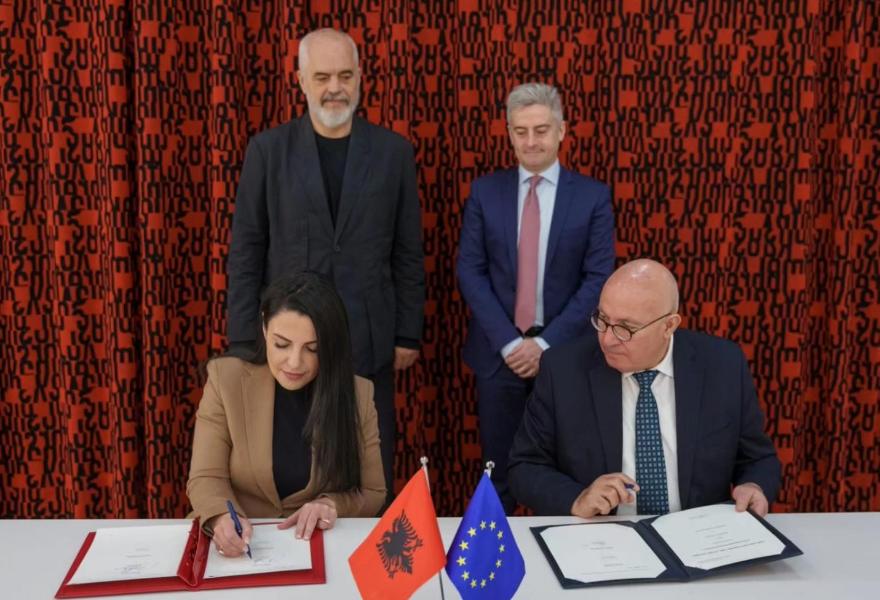
- Part of the EU Economic and Investment Plan, the project benefits from a substantial package of grants, loans and technical assistance.
- The project will promote the modal shift to rail, contributing to a more environmentally sustainable transport system in line with the EU Green Agenda.
- Improved railway infrastructure contributes to increased regional connectivity, and to the efficiency of freight and passenger rail transport.
EIB Global, the arm of the European Investment Bank (EIB) for financing activities outside the European Union, has signed a €100 million loan with Albania under a Team Europe financial package for the modernisation and electrification of a 120 km railway line from Vorë in central Albania to Hani i Hotit on the border with Montenegro. The project is in line with strategic EU support for the construction and rehabilitation of key railway sections in the Western Balkans, aiming to increase the accessibility and attractiveness of the rail transportation, contributing to socioeconomic development, better trade links, the shift to more sustainable modes of transport and the decarbonisation of local economies.
The Team Europe financing package for this project comprises the €100 million EIB loan finalised today, an approved €126 million EU investment grant channelled via the Western Balkans Investment Framework (WBIF) and a €98.75 million loan from the European Bank for Reconstruction and Development. The signature ceremony took place in Tirana and was attended by an EIB Global delegation led by EIB Vice-President Kyriacos Kakouris, Albanian Prime Minister Edi Rama, Deputy Prime Minister Belinda Balluku and Chargé d’affaires of the EU Delegation to Albania André Rizzo.
EIB Vice-President Kyriacos Kakouris, who is responsible for the Bank’s activities in the Western Balkans, said: “This project is an excellent demonstration of the strong partnership under the Team Europe initiative. Our joint efforts will strengthen the connection between Albania, the region and the European Union, while promoting sustainable mobility that lays the foundation for a smart, resilient, safe and inclusive rail network in the country and the region. As the EU climate bank, the EIB is fully engaged in supporting the development and modernisation of the railway sector in Albania and the whole region.”
Belinda Balluku, Albania’s Deputy Prime Minister and Minister of Infrastructure and Energy, said: “The Vora - Hani i Hotit railway line, spanning 120 kilometers to the Montenegrin border, is of significance not only for Albania, but also for regional connectivity, as it will facilitate the movement of goods and citizens, while driving economic growth. Following the Tirana-Durrës railway line with its branching in Rinas, Vora-Hani i Hotit railway line represents the Albanian Government's second major project in railway transportation. The EIB remains one of our most important partners in realizing several strategic projects regarding road and rail infrastructure.”
The project will enable the rail track electrification, the reconstruction of 12 railway stations, the introduction of a new telecommunication and signalling system, and safety improvements. These will enable traffic speeds of up to 120 km/h, increasing the efficiency and capacity of passenger and freight rail transport. As an extension of the Core TEN-T Mediterranean Corridor, the Vorë-Hani i Hotit railway line connects Tirana with Podgorica and is the only railway link between Albania and rest of Europe.
Chargé d’affaires of the EU Delegation to Albania André Rizzo said: “As Albania and the region move forward on their path to EU integration, people can already experience concrete benefits of this process. The EU-funded Vore-Hani i Hotit railway line will bring faster and safer travel for both cargo and passengers along the Adriatic coast. It will boost connectivity for people and trade in Albania, in the Western Balkans region and with the EU. Moreover, it will also contribute to the advancement of Albania’s green transition.”
A team of experts from the joint European Commission and EIB advisory programme JASPERS have developed an action plan to strengthen capacity for managing railway infrastructure projects in Albania. The EIB is also providing technical support to the government of Albania for the preparation of the Corridor VIII rail project on the Durres-Rrogozhine and Rrogozhine-Pogradec railways.
The EIB is the leading financier of railway projects in the Western Balkans, having lent over €1.7 billion for rail sector investments in the region to date. In the last ten years, the Bank has provided over €40 billion to support rail projects across the world.
Background information:
About the EIB and EIB Global:
The EIB is the long-term financing institution of the European Union, owned by its Member States. It makes long-term finance available for sound investment in order to contribute towards EU policy goals. The EIB supports projects in four priority areas: infrastructure, innovation, climate and environment, and small and medium-sized enterprises (SMEs). EIB Global is the EIB Group’s specialised arm devoted to increasing the impact of international partnerships and development finance, and a key partner of the Global Gateway. We aim to support €100 billion of investment by the end of 2027 — around one-third of the overall target of this EU initiative. Within Team Europe, EIB Global fosters strong, focused partnerships alongside fellow development finance institutions and civil society. EIB Global brings the EIB Group closer to local people, companies and institutions through our offices around the world.
About the EIB in the Western Balkans:
The EIB is a leading international financier in the Western Balkans. Since 2010, the Bank has financed projects worth over to €10 billion in the region. On top of its continued support for the reconstruction and upgrade of public infrastructure, since 2010 the EIB has expanded into many new areas, such as healthcare, research and development, education, and small and medium enterprises.
About the EIB in Albania:
The EIB has been active in Albania since 1995. To date, 26 projects have been financed and over €600 million invested, mostly in key transport, energy, water and wastewater infrastructure. For more information regarding the EIB’s projects in Albania, please see: Albania and the EIB

